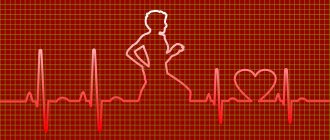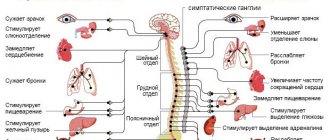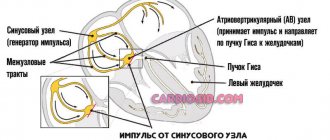During pregnancy, a woman experiences a special state of her body. And the joy of upcoming motherhood should not be overshadowed by problems with the cardiovascular system. What should you do if you are carrying a baby and have been diagnosed with sinus tachycardia? Let's look at this diagnosis.
Pregnancy is not only a pleasant period in a girl’s life. This is also a responsible time when the expectant mother should pay special attention to her health. Due to the increased load on the body, women may develop various disorders of the cardiovascular system.
Attacks of tachycardia during pregnancy are a common occurrence that accompanies the pregnancy process.
Causes
Why does sinus tachycardia occur in an expectant mother and what to do? Factors that can trigger such problems:
- Changes in the body and all its systems;
- Increased load on the heart muscle due to the common circulatory system in the woman and fetus;
- Enhanced functioning of all organs;
- Compression of the abdominal and chest organs, which intensifies as the fetus grows;
- Changes in the hormonal levels of a pregnant woman.
Sinus tachycardia during pregnancy is an important symptom that requires attention from the woman. After all, a rapid heartbeat when a woman is at absolute rest indicates dysfunction of the sinus department, the main purpose of which is the formation of conductive impulses. As a result, a pregnant woman experiences an excessively rapid heartbeat (more than 90 beats per minute) against the background of normal temperature and other indicators of the body’s functioning.
We note the fact that the causes of tachycardia during early pregnancy must be identified and monitored with special attention. After all, the course of pregnancy, the health of the fetus and the expectant mother largely depend on the correct diagnosis of a woman.
Mild sinus tachycardia in pregnant women is considered normal and does not require treatment. Attacks of too fast heart rate occur and disappear suddenly. What to do at this moment?
At this time, you just need to try to calm down and relax as much as possible, and not react to nervous stimuli. Try to stay alone and calm down. The heart of the expectant mother works “for two”, so it contracts somewhat more intensely than usual, therefore, in the last trimester, sinus tachycardia is quite common in women and is not a cause for concern.
But if a patient is diagnosed with a pathological form of the disease during pregnancy, then this condition requires attention from doctors.
sinus tachycardia during pregnancy
I allocated 2 days for this and signed up in advance. Yesterday I had an ecg and an endocrinologist. They wrote - sinus tachycardia. I persuaded the endocrinologist to put a stamp just like that.
Today I saw an ophthalmologist, - she still couldn’t determine whether I have ICP or not, in general, everything she said was with inserts “probably”, “maybe”, “and before, what did they write?”
Next on the list is a dentist who prescribed me Paradontax and said that she wouldn’t do anything during pregnancy because... does not burn. But I am threatened with gingivitis during pregnancy. I read that periodontax will only relieve the symptoms, but first you need to go to a periodontist and have your teeth cleaned. If I have time and money, I’ll run away. There is no tartar, there is plaque. But it’s impossible to do anything in the mouth—it bleeds right away.
Well, in the end, the whole picture was spoiled by a smelly therapist. I don’t understand how a man can go to work in a state clinic and see grannies from morning to evening. I can understand narrow specialists - but these are - wow, not a man. A young and meticulous dumbass, with the imprint of the village on his face...
For 30 minutes of my time from the moment of recording, he chatted with the women from the next office, conversations throughout the entire corridor, conversation about nothing!!! Then he returned, I went in, there was another nurse sitting in this tiny room, no more than 40 years old. And they’re like, let’s interrogate me about who lives where (about my whole family!!!). About the old registration address - they’re meticulous about everyone. And ask the same thing 5 times (REALLY 5 times!!!!) Why on earth should I even report data to them? Everyone who lives there does not go to this clinic at all!
As a result, he told me that first let my husband take a fluorography, and then he will give an extract and put a stamp!!! Yeah, wait a minute, I don’t understand, where do we live anyway? As far as I remember, fluorography in our country, like vaccinations, is a voluntary matter for everyone. Personally, I only need it for the partner birth option, otherwise I wouldn’t even bother. He gave directions. I had 2 days in which I could leave the child, I’m not going to waste any more of my time. The recording is not a recording, it’s just bullshit - you sit in line and smell nasty coughs and listen to smacks and sniffles...
I ask: “What extract won’t you give me? Actually, I don’t have any statement, I’ve never been served by you.” And he told me: “Well, that means I won’t put a stamp!”
Well... with her. I passed the specialists.
I’ll have to ask about the pediatrician at the appointment, maybe I don’t want to be pushed around like the last time after I was discharged. All these walks, and even in the summer, I have to watch over them...
Yes, I remember, I was discharged from the maternity hospital on Friday, the doctor came on Saturday... ENT!!! I know that she is an ENT specialist, but it turns out that maybe there are not enough staff, she works as a nurse on duty and comes on Saturdays. The doorbell rings in the morning, the baby is sleeping, I’m sleeping - the first night at home after giving birth! She flies in while she is fussing in the corridor, I jump up, and then blood starts pouring out of me onto the floor... Ew, I’m ashamed, I’m at a loss, my husband is running for a rag, the pastel is not tucked in, I’m in shorts and a shirt. She comes in, looks at her son, well, what can you find there - yesterday at discharge we were plump and healthy... But no, I see, she says, there’s a tiny blister somewhere in the mouth (I looked a lot later and couldn’t find it), he prescribes it right away geneferon... The child is screaming because he was woken up. Naturally, I didn’t go for any geneferon...
And so I think, maybe we don’t have to attach ourselves, we won’t go there anyway. A pediatrician at a paid office can now write to me. I don’t want to drag myself to the nursery yet.
That's it, I exhaled. Now I'm calm and happy.
Symptoms
If a woman begins to feel severe nausea and dizziness, and also has bouts of vomiting, she should definitely tell her doctor about this. Such symptoms may indicate a pathological form of the disease, which is characterized by longer and more severe attacks of increased heart rate.
During pregnancy, a woman is under no circumstances recommended to expose herself to excessive physical exertion or experience any kind of nervous shock. If a patient experiences tachycardia while pregnant, doctors strongly advise her to protect herself from all kinds of activity and to rest and relax more.
Such measures in most cases help to avoid increased heart rate (heart rate) and attacks of tachycardia. But if after the patient’s rest this does not happen, the symptoms remain, she should consult a doctor for help.
If tachycardia during pregnancy is pathological, then this problem must be solved only with the help of qualified doctors in modern clinics. Therefore, it is so important to promptly diagnose and begin to treat such a disease.
Sinus rhythm and sinus tachycardia
Normally, the heart rhythm is set from the sinus node, so the sinus rhythm of the heart is the norm. Sinus tachycardia is a rapid heart rate (more than 90 beats per minute), set, as expected, from the sinus node. Sinus tachycardia in children is determined by other indicators of heart rate - according to the age norm, since the normal heart rate in children is higher than in adults.
Palpitations - a feeling of rapid or increased heartbeat. Often combined with tachycardia. Palpitations are a subjective symptom. Some people periodically feel even normal heartbeats, while others may not feel serious rhythm disturbances. Therefore, the feeling of heartbeat itself is not a sign of heart disease.
Increased heart rate is a normal reaction of the body to physical activity and stress, which is felt as palpitations and tachycardia. As a rule, this is sinus tachycardia, which occurs as a result of complex regulatory mechanisms of the cardiovascular system and, above all, an increase in the sympathetic influence on the cardiac pacemaker - the sinus node. The increased sinus rhythm of the heart allows the tissues to be supplied with oxygen and nutrients more actively, since during physical activity energy needs increase significantly. Sinus tachycardia of the heart after rest goes away on its own and does not cause discomfort.
Only in combination with other symptoms can a heartbeat indicate deviations from the norm. The symptoms that accompany palpitations depend on the disease of which they are a manifestation.
Possible complications
What complications can sinus tachycardia cause for a pregnant woman? Pregnancy is a period in a woman’s life when the risks of many diseases increase or existing health problems become more complicated.
If this disease is not treated, allowing its development to take its course, disruption of the nervous system may occur, the emotional background may change, mood swings may intensify, sleep disturbances and a state of lethargy may appear. As a result, the woman’s immunity will decrease, and the already weakened body will constantly remain in a weakened state.
Such problems in a pregnant woman can negatively affect the condition of her body and her quality of life. In addition, with such a disease, the risk of complications during pregnancy and delivery increases. That is why heart problems in the expectant mother must be identified early for the success of their treatment.
First signs of pregnancy
17.07.2020
Most often, girls confuse the signs of pregnancy with the imminent onset of their period. After all, they are often very similar to each other. But you should be more careful, since pregnancy at the initial stage may not always proceed well without pathologies.
What signs can be noticed in the very first weeks of pregnancy:
- mild pain in the abdomen and light bleeding;
- breast tenderness or tenderness ;
- frequent mood swings.
These signs may appear from the first week of pregnancy . As you can see, many people experience the same symptoms before their period begins.
During pregnancy in the first weeks, pain in the lower abdomen is explained by the fact that fertilization of the egg occurs and its further attachment to the endometrium of the uterus .
Frequent mood swings are also associated with increased hormonal levels during pregnancy , which significantly affects emotionality.
The first four weeks of pregnancy do not show obvious signs. The expectant mother often may not even notice any changes.
From the fourth week, more striking signs of pregnancy appear:
- delay of menstruation;
- breast swelling , darkening of the areolas;
- nausea;
- drowsiness, severe fatigue;
- frequent urination ;
- dizziness;
- temperature change.
Delay
And then the most important sign appears - a delay in menstruation. Most girls notice this, since with a regular cycle, delays are not natural.
Normal delay may be 1-2 days. A delay of 5 or more days is considered an alarm bell. But even with such a delay, a regular pregnancy may not show a possible pregnancy , since the period is too short. Therefore, you can go to the antenatal clinic and donate blood for hCG levels.
Nausea
Nausea is not always a clear sign of pregnancy . stomach problems . During pregnancy nausea most often appears in the morning, but can also persist throughout the day. When visiting a gynecologist , this fact should be noted, since too frequent nausea and vomiting can negatively affect pregnancy .
Frequent urination
Many may think that the cause of this was a common cold. But this feature is also a sign of possible pregnancy . During fertilization, the uterus begins to enlarge, thereby irritating the bladder , so there is a frequent desire to go to the toilet.
Dizziness
Dizziness occurs due to low blood pressure. With sudden movements or changes in body position, you may feel dizziness , darkening of the eyes , spots, and blurred vision.
There is no need to panic if your blood pressure is low, but if you experience frequent increases in blood pressure, you should definitely notify your doctor .
Summarize. If any signs appear, you should immediately take a test or get tested for hCG. Since in the early stages pathologies in the development of pregnancy , so do not delay. It would be best to do a pelvic ultrasound to confirm or refute pregnancy . And in case of pregnancy , eliminate the risk of ectopic pregnancy .
Published in Pregnancy and pregnancy management Premium Clinic
Treatment and its features
Tachycardia in a pregnant woman requires careful diagnosis and the correct treatment regimen. First of all, the patient is prescribed blood tests and an ECG. In some cases, at the doctor’s insistence, additional procedures may be performed.
Treatment of tachycardia during pregnancy cannot be carried out inconsistently. If the doctor has drawn up a treatment regimen using medications, consultations with a psychoanalyst or neurologist, this regimen must be strictly adhered to.
If you are worried about your health and the health of your unborn baby, if symptoms of tachycardia appear, consult a gynecologist or visit a cardiologist. Health-safe diagnostics will help to accurately establish a diagnosis or reassure the expectant mother if fears are not confirmed.
Our doctors
Kedrinskaya Larisa Ivanovna
Experience 18 years / Doctor of the highest category, Candidate of Medical Sciences / General practitioner, cardiologist
To make an appointment with a doctor
Kruzhalova Olga Sergeevna
25 years of experience / Leading specialist / Obstetrician-gynecologist
To make an appointment with a doctor
Vershuta Elena Vasilievna
More than 23 years of experience / Highest category, Candidate of Medical Sciences / Pediatric cardiologist, cardiologist, therapist
To make an appointment with a doctor
+









